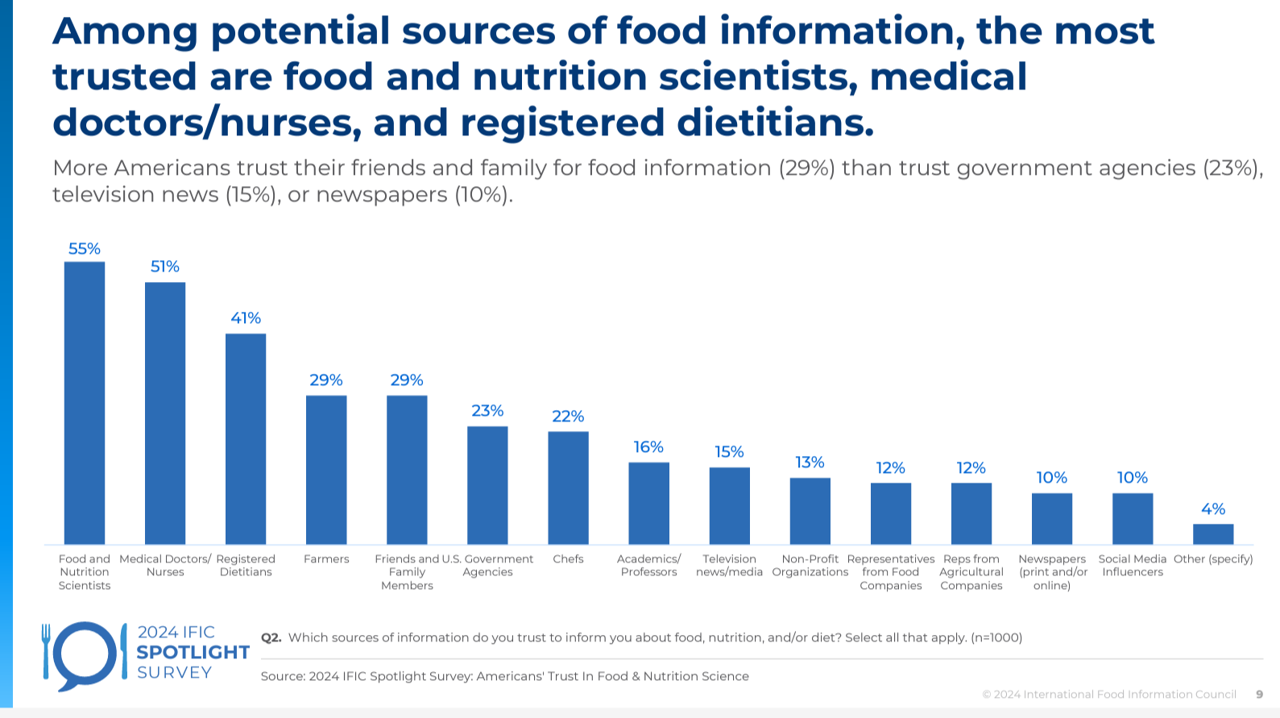Only 2 in 5 people in the U.S. strongly trust science concerning food, nutrition, or diet, we learn from the 2024 IFIC Spotlight Survey: Americans’ Trust in Food & Nutrition Science, published in October.

IFIC is the International Food Information Council, a non-profit organization with a mission of communicating science-based information about food safety, nutrition, and sustainable food systems.
IFIC surveyed 1,000 U.S. adults online in July to gauge consumers’ views on food and science.

The most-trusted sources of food information are the scientists involved in researching nutrition, doctors and nurses, and registered dietitians.
Much lower in trust equity are farmers, friends and family, U.S. government agencies, and chefs, each garnering 22-29% of trust among consumers.
Least-trusted sources for the science on food and nutrition are social media influencers, newspapers (print or digital), blogs from agricultural companies, representatives from food companies, and non-profit organizations (ironically, IFIC being one such entity).

A key driver contributing to eroding trust in food science is the nature of changing recommendations consumers face in media regarding what to eat and drink.
4 in 5 U.S. consumers told IFIC that it seems those recommendations are “always changing,” resulting in people feeling confused, frustrated, doubtful, or stressed about the choices they face for food and diet.
This feeling of anxiety and stress under the umbrella of self-care for well-being converges with my recent post discussing Lululemon’s research into the stressors felt among folks trying to adopt well-being strategies in daily living — explained here in Health Populi. — the concept of “well-being burnout.”

Health Populi’s Hot Points: Peoples’ eroding trust in institutions, generally, is a global phenomenon, and in science is a concerning one — across the many aspects of human life science touches, from health to food to environment and education, and other venues.
IFIC’s research tells us that most U.S. consumers are more likely to trust food advice if it comes from a registered dietitian, shown in the chart from the study. 
In 2016,, a PwC study on “Building the Dream Team” looked into the future of primary care and what roles physicians would look to hire for an extra FTE of staff to complement their care teams. Interestingly, physicians cited, first, nutritionists — followed by mental health professionals — to add to their teams.
Increasingly, patients-as-health consumers and health citizens view food-as-medicine, a trend accelerated during the pandemic. We have witnessed large chain grocery stores and pharmacies beginning to embed dietitians and nutritionists on staff, who can help food shoppers “curate” a healthy grocery cart based on a family’s health needs, taste preferences, and to be sure, household budgets sensitized during the inflation facing food shoppers.
In addition, my recent meetings at CES, the annual consumer electronics trade show, have me speaking with the likes of Samsung, GE, and other home appliance and technology innovators who are developing solutions for smart(er) kitchens (especially refrigerators) to bolster consumers’ demands for healthy cooking and eating. I’ll be reporting more on that come January 2025 when I’ll be at CES exploring all aspects of digital health.
Expect food-as-medicine to be scaled through technology, especially consumer-facing solutions, along with human touch points of nutritionists and health coaches. Stay tuned….
As a postscript.…there is important research just-published in Health Affairs Scholar on personalized nutrition and regulatory implications which provides additional context for consumers’ growing engagement in food and health.






 Grateful to Gregg Malkary for inviting me to join his podcast
Grateful to Gregg Malkary for inviting me to join his podcast  This conversation with Lynn Hanessian, chief strategist at Edelman, rings truer in today's context than on the day we recorded it. We're
This conversation with Lynn Hanessian, chief strategist at Edelman, rings truer in today's context than on the day we recorded it. We're